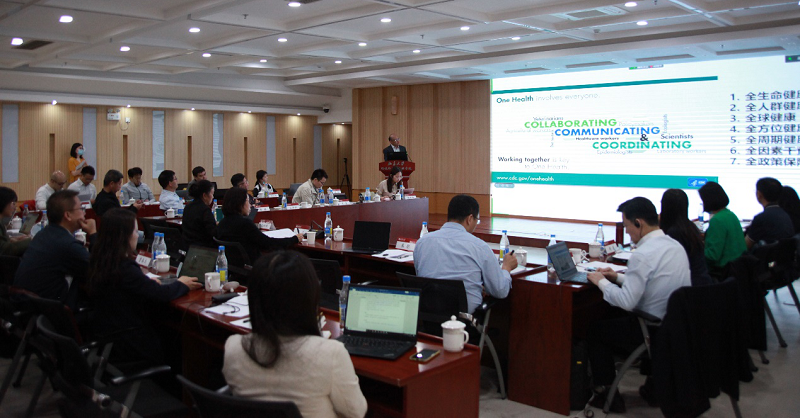
This workshop invited participants from top universities, research institutions, government authority and its affiliated institutions and private sectors in the field of environment, health and climate change to present research findings and innovative thoughts, providing comprehensive scientific and professional perspectives to Hainan and China’s healthy and low carbon development. It also built an effective communication platform between the academic community, decision-makers and other stakeholders, laying a good consensus foundation for the cooperation among above stakeholders.
Professor ZHANG Shiqiu from CESE presided over this meeting and introduced its background and goals. She pointed out that One-Health seminar aimed to support the implementation of the global One-Health demonstration project in Hainan funded by the World Bank. This project establishes its overall goal on setting up a One-Health governance system with the significance of global leadership and role model and takes the improvement of public health as the key mission. Additionally, the important content of the project implementation is in the aspects of interdisciplinary joint research, talent training and international cooperation, etc.
In the meeting, more than 20 professional reports were given by participants to discuss the key topics of the project, including strategies for surveillance and control of infectious diseases, the impact and control of antibiotic resistance, environmental health issues, big data platform construction, health policy system construction and government governance capabilities, industry chain, etc.
Professor ZHOU Xiaonong from Shanghai Jiaotong University - Edinburgh One-Health Research Center stated that "One Health" emphasizes cross-departmental, multi-disciplinary and global cooperation to jointly improve the overall health of humans, animals and the environment. Solving health and environmental problems requires the use of systematic thinking and perspectives to find effective solutions.
 China solemnly pledges to reach its carbon peak in 2030 and achieve carbon neutrality in 2060. In order to achieve this goal, it is essential for local provinces and cities to formulate action plans of carbon dioxide emissions reduction and carbon neutrality, and implementation plans by industry and field, and to establish a policy framework and institutional arrangements to guarantee the implementation and enforcement. Due to its unique development positioning, Hainan Province faces both opportunities and challenges under the ambitious sustainable development goals of carbon peak and neutrality. Besides, experts at the workshop comprehensively discussed how to promote the innovative development paths of industrial structure optimization and upgrading, energy structure adjustment, and promote the establishment of carbon market and carbon tax and other financial instruments and mechanisms for achieving carbon neutrality goals. In addition to that, they also provided tailored low-carbon development suggestions based on the characteristics of Hainan's industrial and energy structure, and forest carbon sink resources.
China solemnly pledges to reach its carbon peak in 2030 and achieve carbon neutrality in 2060. In order to achieve this goal, it is essential for local provinces and cities to formulate action plans of carbon dioxide emissions reduction and carbon neutrality, and implementation plans by industry and field, and to establish a policy framework and institutional arrangements to guarantee the implementation and enforcement. Due to its unique development positioning, Hainan Province faces both opportunities and challenges under the ambitious sustainable development goals of carbon peak and neutrality. Besides, experts at the workshop comprehensively discussed how to promote the innovative development paths of industrial structure optimization and upgrading, energy structure adjustment, and promote the establishment of carbon market and carbon tax and other financial instruments and mechanisms for achieving carbon neutrality goals. In addition to that, they also provided tailored low-carbon development suggestions based on the characteristics of Hainan's industrial and energy structure, and forest carbon sink resources.
The workshop was co-organized by an international non-profit organization Energy Foundation (China) and the global research project Monsoon Asian Integrated Research for Sustainable Development under Future Earth (MAIRS-FE). Dr. ZOU Ji, CEO of Energy Foundation and President of Energy Foundation China, attended the meeting and gave a presentation. He analyzed the driving factors and paths of low-carbon transition and highlighted the key strategy for achieving carbon neutrality, including sustainable energy consumption and decarbonization of the power sector, electrification, fuel conversion, etc. Besides, Professor ZHU Tong, Dean of CESE and Chair of the MAIRS-FE Scientific Steering Committee, gave a speech on Carbon Neutrality, One-Health, and Ecological Civilization. He emphasized that their common characteristics are interdisciplinary and systematic thinking, and environmental health is the key content under the framework of One-Health. In addition, Professor ZHU Tong also introduced the development history, discipline system and talent team of the environmental health discipline of Peking University.
 Ms. XU Lan, Deputy Director of the Hainan Provincial Development and Reform Commission, delivered a speech at the closing ceremony. According to her speech, the successful holding of the seminar is conducive to the better design and implementation of One-Health demonstration projects and optimization of low-carbon development strategies in Hainan Province. She welcomed participating universities and research institutions to maintain communication with Hainan Province to actively explore cooperation opportunities and provide further support for science-based decision-making.
Ms. XU Lan, Deputy Director of the Hainan Provincial Development and Reform Commission, delivered a speech at the closing ceremony. According to her speech, the successful holding of the seminar is conducive to the better design and implementation of One-Health demonstration projects and optimization of low-carbon development strategies in Hainan Province. She welcomed participating universities and research institutions to maintain communication with Hainan Province to actively explore cooperation opportunities and provide further support for science-based decision-making.
